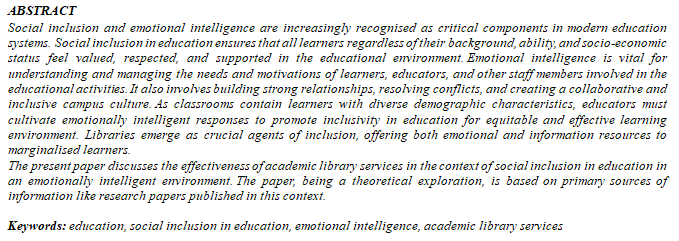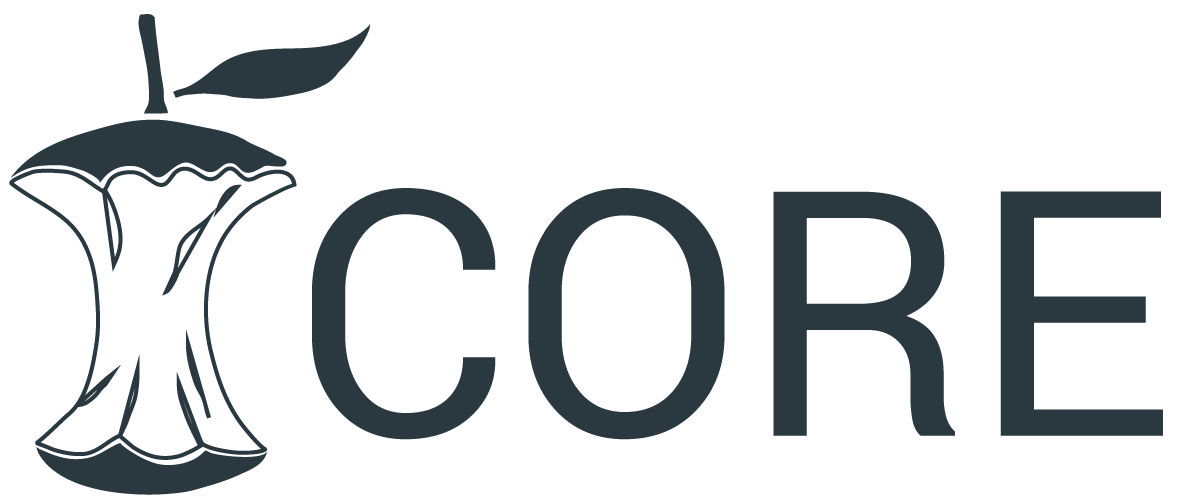Social Inclusion in Education and Role of Emotional Intelligence from the Academic Library’s Perspective
Keywords:
education, social inclusion in education, emotional intelligence, academic library servicesAbstract
Social inclusion and emotional intelligence are increasingly recognised as critical components in modern education systems. Social inclusion in education ensures that all learners regardless of their background, ability, and socio-economic status feel valued, respected, and supported in the educational environment. Emotional intelligence is vital for understanding and managing the needs and motivations of learners, educators, and other staff members involved in the educational activities. It also involves building strong relationships, resolving conflicts, and creating a collaborative and inclusive campus culture. As classrooms contain learners with diverse demographic characteristics, educators must cultivate emotionally intelligent responses to promote inclusivity in education for equitable and effective learning environment. Libraries emerge as crucial agents of inclusion, offering both emotional and information resources to marginalised learners.
The present paper discusses the effectiveness of academic library services in the context of social inclusion in education in an emotionally intelligent environment. The paper, being a theoretical exploration, is based on primary sources of information like research papers published in this context.
Downloads
References
Jan, S., & Anwar, M. (2019). Emotional intelligence, library use and academic achievement of university students. Journal of the Australian Library and Information Association, 68, 38-55.
Jan, S., Anwar, M., & Warraich, N. (2018). The relationship between emotional intelligence, library anxiety, and academic achievement among the university students. Journal of Librarianship and Information Science, 52, 237-248.
Rajendran, P., Athira, B., & Elavarasi, D. (2020). Teacher competencies for inclusive education: Will emotional intelligence do justice?. Education 3-13, 9, 169-182.
Elmi, C. (2020). Integrating social emotional learning strategies in higher education. European Journal of Investigation in Health, Psychology and Education, 10, 848-858.
Katsora, K., Kaprinis, S., & Strigas, A. (2022). The role of special educators’ emotional intelligence in self-efficacy and social inclusion of students with disability. European Journal of Special Education Research.
Heyder, A., Südkamp, A., & Steinmayr, R. (2020). How are teachers' attitudes toward inclusion related to the social-emotional school experiences of students with and without special educational needs?. Learning and Individual Differences, 77, 101776.
Polat, F. (2011). Inclusion in education: A step towards social justice. International Journal of Educational Development, 31, 50-58.
Skura, M., & Świderska, J. (2021). The role of teachers’ emotional intelligence and social competences with special educational needs students. European Journal of Special Needs Education, 37, 401-416.
Brackett, Marc A. et al. (2012). Enhancing academic performance and social and emotional competence with the RULER feeling words curriculum. Learning and Individual Differences, 22(2), 218-224.
Salovey, P., & Mayer, J. D. (1990). Emotional intelligence. Imagination, cognition and personality, 9(3), 185-211.
Goleman, D. (2001). Emotional intelligence: Issues in paradigm building. The Emotionally Intelligent Workplace, 13-26.

Downloads
Published
How to Cite
Issue
Section
License
Copyright (c) 2023 Chinmay Mukhopadhyay

This work is licensed under a Creative Commons Attribution 4.0 International License.
Research Articles in 'Management Journal for Advanced Research' are Open Access articles published under the Creative Commons CC BY License Creative Commons Attribution 4.0 International License http://creativecommons.org/licenses/by/4.0/. This license allows you to share – copy and redistribute the material in any medium or format. Adapt – remix, transform, and build upon the material for any purpose, even commercially.









